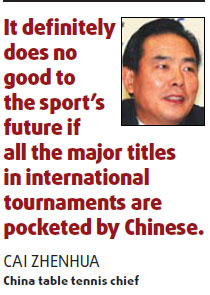A chief official from the China State General Administration of Sport (SGAS) has claimed the national team's overwhelming dominance at the recent Table Tennis World Championships only represents a "failure" to develop the sport internationally.

The team bagged every title on offer at the championships, which ended on Tuesday, after each final was an all-Chinese affair.
"The truth is we failed again (to help develop the world's overall level)," said Cai Zhenhua, the deputy director of SGAS and also the president of the Chinese Table Tennis Association.
Cai insisted China should take responsibility to revive the sport globally.
"I know some Chinese people do not understand why we should do this and fear China will be challenged one day.
"But it definitely does no good to the sport's future if all the major titles in international tournaments are pocketed by Chinese."
China's dominance was even more pronounced at the latest worlds where the team swept 17 of the 20 medals in all five events.
Just three bronze medals were won by non-Chinese, Japan's Jun Mizutani/Seiya Kishikawa in the men's doubles and Jiang Huajun/Tie Yana of Hong Kong and Kim Kyung-Ah/Park Mi-Young of Korea in the women's version.
Cai said if table tennis was to thrive globally, China must help other countries raise their game.
"We should help popularize table tennis and raise the standard of play worldwide, not only in China. I don't want only China to enjoy table tennis, I hope the whole world will enjoy it.
"It's our duty to offer the secret of our success to the world," he added.
Cai confirmed China would send national coaches to instruct overseas players.
Media elements slammed this as a "plan to raise wolves" but Cai disagreed with the sentiment.
"It does not make sense. From my point of view, China needs more strong opponents right now because it will make the sport competitive and interesting."
China have dominated the past decade, missing only the men's singles titles at the 2003 championships in Paris.
The sport's governing body, the International Table Tennis Federation (ITTF), has moved to make the game more competitive in recent years by introducing larger, slower balls and also banning "speed glue", an adhesive that increases the elasticity of the paddle.
The ITTF also started a new 11-point best-of-seven-game system.
But nothing has been able to curb China's dominance.
Cai, who also enjoyed a glittering career as a top player in the early 1980s, said the team's performance in Japan was something to be proud of.
"The World Championships are the most watched event back in China. Everybody pays a lot of attention to them. Everything had already been decided ahead of the final day," he said, referring to the all-Chinese finals.
"We had already fulfilled our job - a clean sweep of all the gold medals."
Men's world No 1 Wang Hao and women's No 1 Zhang Yining beat defending champions Wang Liqin and Guo Yue in their respective finals to take the singles crowns.
Wang Hao and Chen Qi won the men's doubles and Guo Yue and Li Xiaoxia took the women's doubles, while Li Ping and Cao Zhen clinched the mixed doubles title.
Cai said China had tried to give other teams a fighting chance by sending only newly paired couples to the mixed doubles, but all four semifinal places were taken by members of his team.
(China Daily/AFP May 7, 2009)